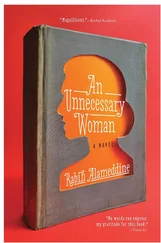Sitt Noha led them through the foyer into the main room of the house. Janet had yet to see a house like this. Her friends all had modern apartments, whereas this house showed nothing belonging to the twentieth century. The floors were all smoothed stones with intricately painted Islamic designs. A huge Persian carpet dominated the room. Other carpets were hung on the walls. The seats were contiguous cushions on low benches against the walls, circling the entire room. Sitt Noha picked up a plate of food from the top of a low hexagonal brass table and took it into the kitchen. She was obviously in the middle of having lunch. “You girls make yourselves at home,” she said as she left the room.
Janet was enthralled by the room. This was the exotic Middle East she had come for. The gilded mirror on the wall, the antique chandelier, the oil lamps that were obviously functional rather than decorative, the finely detailed backgammon board, open, on one of the cushions — apparently a game had been interrupted.
“I can’t believe she was having lunch in the living room,” Régine said, “and she knew we were coming.” She sat rigid, starched, back straight. She pouted, looking more about to cry than angry.
Janet stared at a turquoise rosary on the seat next to her. It was not made for human hands, the beads much too big, for a giant’s hands. The ashtrays on the table in front of her were silver, shaped in the form of pineapples. Why pineapples? She found that amusing. She sat cross-legged on the cushion. She lit a cigarette.
“And my mother likes her,” Fatima said. “I wonder if my mother comes here or asks her to come to our house. I can’t see my mom here.”
Janet hoped after she had been in Lebanon a while, she would be able to understand the conventions better. Sitt Noha was from a lower class than the girls so she should have shown more respect. On the other hand, she was much older so she did not have to. They were her clients, about to pay, so she should have. It was so confusing. How Régine and Fatima figured out what was appropriate was beyond her. At least she had begun to know intuitively when they felt slighted.
She stared out one of the Turkish windows across the room, into the garden, dominated by a black oak and an orange tree, side by side.
“And she’s so fat,” Régine said.
Although Sitt Noha was overweight, Janet did not think she was that fat. Sitt Noha probably weighed less than Régine’s mother. What Régine was actually commenting on was Sitt Noha’s apparent lack of concern with her weight, her lack of any attempt to cover it up.
Sitt Noha walked back into the room, had changed from her housedress into another, dark purple with gold stitching. Janet had to grin. She was sure Régine and Fatima would scorn the new housedress and mock it, but Janet thought it was charming. The housedress made Sitt Noha look like a giant decorated aubergine.
Sitt Noha had a toothpick in her mouth. Tomato paste stained the corners of her lips. She moved a low ottoman right in front of the girls and sat down, knees apart, her hands between them, packing up loose folds of the housedress.
She yelled, at the top of her lungs, “Where is the coffee, Asma?” The girls jumped, startled.
“What can I do for you, my daughters?” she asked in Arabic. All Janet understood was my daughters .
“We’re here for fortune-telling,” Régine said. “Like I said on the phone, our friend here is all the way from America. She doesn’t speak Arabic very well.” Neither did Régine, who was having substantial problems constructing a complete Arabic sentence. Having grown up in a French-speaking household, she, like many Lebanese, had trouble with her mother tongue. “But I can translate for her.”
“And you two don’t want me to tell you anything? You’re not looking for husbands?” Sitt Noha pulled her disheveled hair back, forming a loose ponytail with a rubber band.
“We want to, but we’re here for the American.” Janet was not following the conversation well, but she did notice Régine and Fatima move slightly forward.
“We want everything,” Fatima said. “We can pay.”
“Can you actually tell what our husbands will look like?” Régine asked, breathing noisily, her eyes sparkling.
“When you called,” Sitt Noha said, “I thought you were the foreigner.”
“No,” Régine said. “I’m Lebanese, from Beirut. She’s the American.”
“You said your name was Régime. What kind of name is that?” Janet understood the French word for diet and tried hard to stifle her laugh.
“It’s Régine, with an n ,” Régine replied, moving back into the cushions. She fidgeted with her handbag.
“Why would your mother call you that? Did she know you were going to grow up fat? She must be a fortune-teller too.”
“No, no. It’s Régine, not Régime. It means queen.”
Sitt Noha was oblivious to Régine’s irritation. A little girl, no more than ten years old, dressed in a similar aubergine housedress, came in carrying a silver tray with a pot of coffee. She gave each of the girls a cup. Janet shook her head, but Sitt Noha insisted. She kept moving the toothpick from one side of her mouth to the other. Janet could not take her eyes off it.
“Drink, drink,” Sitt Noha said in English, gesturing with both her hands. She followed that with an aspirating sound as she brought an imaginary cup to her mouth with one hand, while the other held the imaginary saucer steady. “Drink.”
“You must drink it,” Fatima admonished, “or she won’t be able to read your fortune correctly. She must have a coffee cup.”
“Can’t she do it without my drinking coffee?”
“She probably can but the coffee cup finalizes everything.” Fatima drank from her coffee cup, modeling the acceptable behavior to her friend. “She reads the patterns of the coffee sediments left in your cup, the dregs.”
“That’s disgusting.”
Sitt Noha shook her head, appearing to have understood the conversation. “Tell the girl one must suffer to know one’s future. Tell her to drink up.” She adjusted the ottoman beneath her, bunched up her housedress once more and, not so discreetly, scratched herself.
Sitt Noha turned Janet’s cup right side up. “Not ready,” she said in English, turning it over again. She turned Régine’s cup. “Almost ready.” Régine smiled in anticipation.
“I can see a husband already,” Sitt Noha said.
“Really?” Régine was twittering. “Is he tall?”
“Tall? Yes, he’s tall. Not too tall. He’s handsome. Black hair and a mustache. Ah, he’s an engineer. He will fall in love with you. I see that. There are problems.”
“What problems?”
“Your parents won’t approve. They don’t want you to marry him.”
“Why? Why? Is he from a poor family? He’s an engineer. They have to approve.”
“I’m not sure. It’s not clear yet because the coffee hasn’t settled. See this line. Look here. This shows how much he loves you. This here shows problems.”
“I must know why. They must approve. I don’t want to elope. I want a big church wedding and a big reception. Like my sister.”
“Ah, there you go. It says here there will be no church wedding. He’s a Muslim.”
“I can’t convert.”
“You will.”
“Are you sure he’s not a Druze? He’d be the one who would have to convert if he’s a Druze. Tell me he’s Druze.”
“No. He’s not Druze.”
“Oh, my god,” Régine exclaimed. “Don’t tell me he’s. ” She could not even finish the sentence. Even Fatima gasped.
“No,” said Sitt Noha. “He’s not a Shi’ite. He’s a Sunni, from Beirut.”
“Oh, thank god.”
“Hey, maybe I know him,” Fatima said. “You know what. Maybe it’s my cousin Nabil. He’s studying engineering at USC right now. He’s tall with black hair and a mustache. Maybe it’s him.”
Читать дальше












